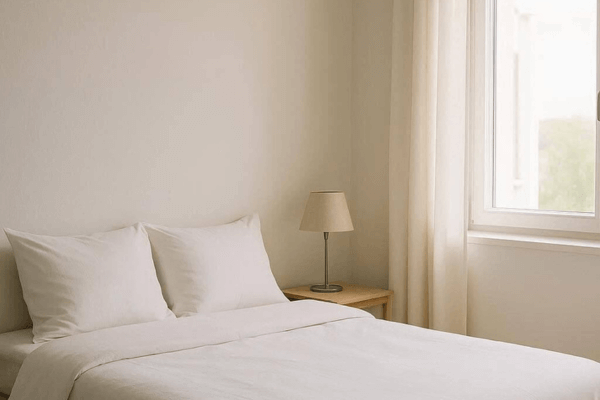Introduction to Minimalism and Health
In recent years, minimalism has gone beyond being just an aesthetic trend to become a lifestyle capable of profoundly transforming physical health. The minimalist philosophy, which values the idea of “less is more,” is not limited to owning fewer things but involves simplifying choices, reducing excesses, and focusing on what truly matters in all aspects of life.
But how exactly does minimalism influence the human body? Can reducing excess truly bring real benefits to physical health, in addition to impacting mental well-being? The answer is yes, and this complete guide will show you all the points of connection between minimalism and health.
What is Minimalism?
Minimalism is the practice of simplifying life by reducing distractions and excess to make room for what really matters. Contrary to what many think, it doesn’t mean living with nothing but rather living consciously, making intentional choices, and focusing on the essentials.
Applied to physical health, this means prioritizing healthy habits, eliminating the unnecessary, and building a routine that benefits both body and mind.
The Relationship Between a Minimalist Lifestyle and Physical Well-being
A minimalist lifestyle creates an environment that fosters bodily balance. By reducing unnecessary stimuli, organizing physical spaces, and simplifying habits, the body responds with more energy, less stress, and a significantly higher quality of life.
Indirectly, minimalism also helps create consistency in healthy habits since it eliminates distractions and keeps the focus on what truly matters for physical well-being.
Physical Benefits of Minimalism
Stress reduction and its impact on the body
Scientific studies show that chronic stress can cause serious physical problems such as hypertension, muscle pain, and weakened immunity. A minimalist environment, free of excessive stimuli, helps reduce mental overload, directly reflecting in better physical health.
Minimalism and quality sleep
Good sleep is essential for health, and minimalist environments tend to favor better sleep since they avoid visual pollution, excess objects, and unnecessary distractions like artificial lights.
Energy and vitality in everyday life
Fewer worries and fewer stimuli mean more energy for the body. Minimalism creates mental and physical space for practices that increase vitality, such as simple exercises, good nutrition, and adequate rest.
Minimalism in Nutrition
Mindful eating and healthy choices
Adopting minimalist eating means choosing real food, prepared simply, and avoiding unnecessary consumption of processed foods.
Reducing consumption of ultra-processed foods
With fewer unnecessary options at home, the temptation to eat processed foods decreases, leading to a naturally more balanced diet.
How to simplify meal routines
A weekly menu with simple, nutritious, and repeatable meals can reduce the stress of food choices, improve digestion, and bring more lightness to daily life.
Minimalism and Physical Activity
Simple, functional exercises for everyday life
Minimalism applied to exercise doesn’t require expensive equipment, luxurious gyms, or complicated routines. On the contrary, it encourages functional exercises using body weight, such as squats, planks, light running, and walking.
Freedom from aesthetic pressure and healthy exercise habits
Media excess often creates the idea that we need “perfect” bodies. Minimalism helps us see exercise as a path to health, vitality, and well-being rather than mere aesthetic pursuit, reducing pressure and making workouts enjoyable.
Minimalism in the Environment and Physical Health
Organized spaces and impact on posture
Cluttered spaces can cause physical discomfort, poor posture, and even domestic accidents. Minimalist spaces, on the other hand, are functional, obstacle-free, and promote more movement in everyday life.
Reducing allergies and respiratory illnesses
Fewer objects mean less dust accumulation and fewer allergens. People with respiratory issues like rhinitis or asthma often report significant improvement in minimalist homes since cleaning becomes simpler and more effective.
Minimalism and Mental Health: Reflections on the Body
Mind-body connection: how emotional balance strengthens physical health
Mental stress directly influences physical health, increasing risks of heart disease, obesity, and even weakening the immune system. Minimalism promotes mental clarity, reducing emotional overload and strengthening the body as a result.
Mindfulness practices and their influence on physical well-being
Meditation, conscious breathing, and mindfulness practices are much easier to integrate into a minimalist lifestyle. These techniques lower blood pressure, strengthen immunity, and help with muscle recovery after physical activity.
Scientific Studies on Minimalism and Health
Research on minimalism and stress reduction
Princeton University researchers showed that organized and minimalist environments reduce distractions and help the brain process information more efficiently. This mental clarity directly impacts the body by lowering cortisol, the stress hormone.
Evidence of improved sleep and eating habits
Studies published in psychology and behavioral health journals reveal that people who adopt simplified routines tend to sleep better and maintain more balanced diets—both essential for good physical health.
How to Adopt Minimalism to Improve Physical Health
Practical steps to start
- Declutter your home: keep only the essentials.
- Simplify your diet: choose whole foods and avoid processed ones.
- Practice functional exercises: use your body weight and walk more.
- Establish a minimalist sleep routine: a clean room, no screens, and natural lighting.

Minimalist habits for everyday life
- Wear simple, comfortable clothing.
- Reduce unnecessary commitments.
- Avoid digital distractions that harm posture and sleep.
Avoiding common mistakes in the minimalist lifestyle
- Don’t confuse minimalism with deprivation.
- Don’t focus only on aesthetics, but on functionality.
- Avoid comparisons: each minimalist journey is unique.
Challenges and Myths About Minimalism and Physical Health
Can you be healthy without consuming a lot?
Yes. Minimalism shows that physical health does not depend on excessive supplements, expensive equipment, or fad diets. The human body responds better to consistency and simplicity.
Minimalism doesn’t mean deprivation
A common myth is that being minimalist means living with nothing. In reality, it’s about living consciously, choosing what truly benefits your body and your life.

Frequently Asked Questions About Minimalism and Physical Health
1. Can minimalism help with weight loss?
Yes, by simplifying eating and avoiding excess, minimalism naturally promotes healthier choices that can contribute to weight loss.
2. Do I need to quit the gym to be minimalist?
Not necessarily. Minimalism encourages conscious choices. If the gym makes sense for your health, it can be part of your minimalist routine.
3. How does minimalism improve sleep?
Clean, organized, and distraction-free environments help the mind relax, leading to deeper sleep.
4. Does minimalism also improve mental health?
Yes, and this directly reflects on the body. Less stress and anxiety mean lower risk of physical illnesses linked to cortisol overload.
5. Can children benefit from a minimalist environment?
Absolutely. Organized spaces reduce accidents, improve focus, and encourage healthy habits from an early age.
6. Can minimalism prevent diseases?
While it’s not a cure, it helps strengthen the immune system, improves sleep, reduces stress, and encourages healthier eating—preventing common issues like obesity and hypertension.
Conclusion: The Transformative Impact of Minimalism on Physical Health
Minimalism is not just a design trend or a passing fad. It is a lifestyle philosophy that, when applied to physical health, promotes balance, well-being, and quality of life.
By simplifying environments, food choices, and exercise routines, we create space for what truly matters: a healthy body, a peaceful mind, and a life with more energy.
The impact of minimalism on physical health is profound and transformative, proving that often, less really is more when it comes to living well.

